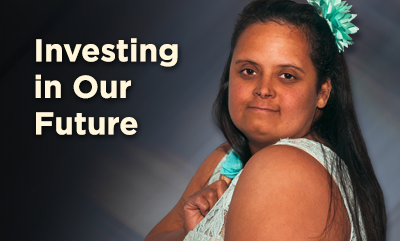
Global Down Syndrome Foundation announces roster of authors committed to establishing Medical Care Guidelines for Adults with Down syndrome
New guidelines aim to address different standards of care and the doubling of life expectancy for individuals with Down syndrome.
DENVER | The Global Down Syndrome Foundation announced today the full roster of authors committed to establishing new medical care guidelines for adults with Down syndrome (“Guidelines”). The Guidelines will draw and build upon previous, important work in the field.
“We are pleased and deeply honored to have such an esteemed group of medical practitioners to help launch this much-needed initiative,” said Michelle Sie Whitten, President & CEO of Global Down Syndrome Foundation. “Because of the dramatically different disease spectrum of people with Down syndrome and their ever-increasing life expectancy, it is critical to update and disseminate best care practices for aging adults with Down syndrome.”
People with Down syndrome are born with three copies of chromosome 21 instead of two, which causes them to be highly predisposed to some diseases that tend to manifest in aging populations (e.g. Alzheimer’s disease, autoimmune disorders). Yet they remain highly protected from other diseases (e.g. breast cancer, heart attacks and strokes). Many such diseases manifest in aging populations.
In the U.S., the life expectancy of an individual with Down syndrome has more than doubled in the last three decades, from 25 years in 1983 to 60 years today. The most recent guidelines for adults with Down syndrome were published in 2001 and the years since have been marked by many advancements in the general medical field and important findings specific to the care of adults with Down syndrome.
“I have had the privilege of serving hundreds of adults with Down syndrome and their families,” said Dr. George Capone, research scientist and director of the Down Syndrome Clinic and Research Center (DSCRC) at Kennedy Krieger Institute and associate professor of pediatrics at the Johns Hopkins University School of Medicine. “To be able to utilize my twenty-seven years of medical experience to inform these guidelines is extremely rewarding – and a lot of hard work. We are grateful to Global for helping us fund this, and, equally important, for committing to fund future guideline revisions every five years.”
The team of lead authors collaborating on the Guidelines includes both medical and behavioral experts in adult Down syndrome care representing many of the foremost medical clinics serving the unique needs of this population from across the United States. Authors committed to collaborating with Global’s Medical Care Guidelines for Adults with Down Syndrome are (in alphabetical order):
Lead Authors
- George Capone (MD)- Director of Down Syndrome Clinic and Research Center, Kennedy Krieger Institute, Associate Professor, John Hopkins School of Medicine, Baltimore, Maryland
- Brian Chicoine (MD)- Medical Director, Advocate Medical Group Adult Down Syndrome Center, Park Ridge, Illinois
- Barry Martin (MD)- Assistant Professor, Division of General Internal Medicine, University of Colorado School of Medicine,, Former Medical Director of the Denver Adult Down Syndrome Clinic, Denver, Colorado
- Dennis McGuire (PhD, LCSW)- Behavioral Expert for Adults with Down syndrome, Global Senior Consultant, former Director of Psychosocial Services, Adult Down Syndrome Clinic, Advocate Lutheran General Hospital, Park Ridge, Illinois
- Kent McKelvey (MD)- Director of Adult and Cancer Genetics Services, University of Arkansas for Medical Sciences, Director of Winthrop P. Rockefeller Multidisciplinary Clinic for Adults with Down syndrome, Little Rock, Arkansas
- Moya Peterson, (PhD, APRN)- Director of Adults with Down Syndrome Specialty Clinic, University of Kansas Medical Center, Kansas City, Kansas
- Carl Tyler (MD, MSc, ABFP, CAQ-Geriatrics)- Director of the Developmental Disabilities – Practice-Based Research Network (DD-PBRN), Practitioner at the Cleveland Clinic, Specializes in geriatrics and adults with I/DD, Cleveland, Ohio
Co-Authors
- Peter Bulova (MD)- Director of University of Pittsburgh Adult Down Syndrome Center, Pittsburgh, Pennsylvania
- Bryn Gelaro (LSW)- Director of Adult Initiatives and Special Projects, Global Down Syndrome Foundation, Denver, Colorado
- Michael Wells (BS)- Research Coordinator for the Developmental Disabilities – Practice-Based Research Network (DD-PBRN), Cleveland, Ohio
The authors will work with Global and ECRI Institute, a non-profit group of statisticians and PhDs specializing in guideline creation, to produce a set of guidelines by the end of 2019. The collaborators hope to have the Guidelines published in medical journals and have committed to ensuring the Guidelines be accessible and free-of-cost to self-advocates, physicians, family members, caretakers, Down syndrome organizations, and others who would benefit from such Guidelines.
“Creating adult guidelines is intimidating because of their importance and because we realize data is likely sparse in certain areas but we are excited to take on the challenge and build this,” said Kent McKelvey, M.D., Associate Professor and Director of Adult and Cancer Genetics Services at University of Arkansas for Medical Sciences. “With this project, we will systematically gather data and then have opportunity to debate and apply decades of combined clinical experience in Down syndrome care to provide educated guidance. We must acknowledge the gaps found and then embrace the need for more research. We must eventually get a playbook into the hands of parents and medical professionals to improve the physical and mental health of with Down syndrome.”
Global has committed to translating the Guidelines into multiple languages and to updating the Guidelines every five years. To date, 36 different local Down syndrome organizations and over 50 individuals have provided and pledged financial support towards the Guidelines, with the rest of the funding being provided by Global Down Syndrome Foundation.
###
About the Global Down Syndrome Foundation
The Global Down Syndrome Foundation is at the forefront of research, medical care, education and advocacy dedicated to significantly improving the lives of people with Down syndrome. Supporting the research of hundreds of scientists around the world, and through our advocates, partners, and affiliates including the Linda Crnic Institute for Down Syndrome and the Anna and John J. Sie Center for Down Syndrome, Global is making an impact on the lives of people with Down syndrome today, and remains focused on finding solutions tomorrow. We are committed to helping people with Down syndrome realize their fullest potential and to lead healthy and productive lives. To learn more, visit www.globaldownsyndrome.org.




 Experience our inspirational and groundbreaking videos and photos. Our children and self-advocates are beautiful AND brilliant!
Experience our inspirational and groundbreaking videos and photos. Our children and self-advocates are beautiful AND brilliant! Make sure your local Representatives are on the Congressional Down Syndrome Task Force.
Make sure your local Representatives are on the Congressional Down Syndrome Task Force.